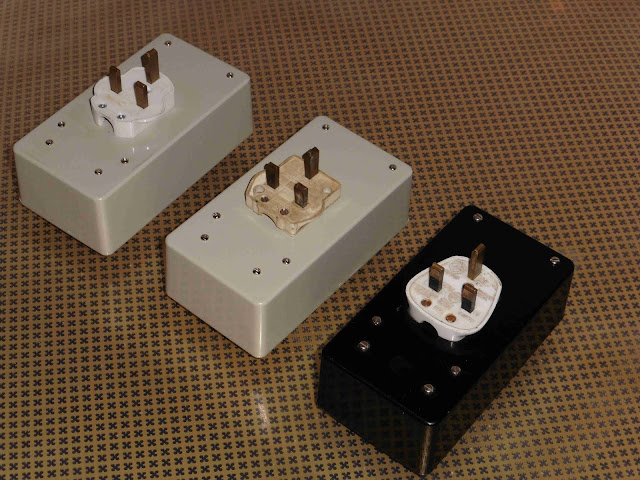I had intended to leave this as an addendum to the original post concerning this old project, but the 'new & improved' Blogger has apparently decided that any editing of past posts will see them treated as being new, receiving the edit date, the original date being lost in the sands of time. This is bloody stupid!!! [Edit: Ok, scratch that, it reverts to the original publish-date, not the edit-date. So why the unnecessary alert when you republish - that's bloody stupid! :) ]
Moving on, there's not really much to add to the RTC project, information-wise. I ordered most of the parts needed years ago. The PCB's I produced using the excellent Proteus EDA package. Although all of the PCB's that make up the main controller and the one switch unit, were produced the old-fashioned way, using a Ferric-chloride solution, given the ease & cheapness of ordering them from China these days, I instead opted to send some business JLCPCB's way - and an excellent job the made of them too, highly recommended!
I've moaned on enough about the BC108 transistors I sourced for these in another post, but I cannot resist a gripe about another component problem encountered while putting these together. I had ordered a few hundred i.c's from the 74LS logic family, between 20-30 varieties, so had plenty of the dirt-common 74LS74 dual D-type flip-flops at hand. What I discovered was that only one 'family' of the 74LS74's I had received would work reliably - for example, any of the chips that began with 'SN' would either not work at all or unreliably at best. All of the ones that work perfectly have identical numbers, which begs the question, are the others just faulty crap that's being sold cheap? If so, of the 12+ 74LS74's I have, only about 4 of them are to spec. Not a happy thought.
Like I've mentioned before, filtering/line-noise seriously limit their reliability. Since these units are merely receivers, there is no way for the main controller to verify that a switch has been toggled On or Off. With 3 switches to play with for the first time, I was quickly introduced to a couple of new firmware bugs. I would bet good money that Mr Browne, the project's creator, developed the s/w with just a single switch at hand. But they're fairly inconsequential with 'normal' use as there is a much higher probability of having missed switching due to filtering/line-noise than to it being down to firmware bugs.
The electronics side of the construction was fairly straightforward. The only complication that arose involved the tuneable miniature mains 'Toko' transformer. Since (unsurprisingly) these are no longer available, I was forced to 'roll my own', which (surprisingly) proved easier than I had expected - finding this spec sheet online helped matters considerably.
While the hardware side of the builds, though 'fiddly', was with care, doable, finding suitable male-plug parts proved a frustrating affair. In order to safely secure them to their enclosure boxes, their 13amp fuses had to be contained wholly within the plastic shell-half of the 'prong-side' - otherwise, I would have been forced to cut a hole in the box for the fuse to stick inside. Situated under the PCB as they are, and with just millimetres between PCB and the live-mains prong, safety would have been compromised and I'd probably be creating a fire hazard to boot! Thing is, mains plugs of the required construction are incredibly difficult to find nowadays. All modern plugs have the fuse extending right into the top half of the plug body. I was actually considering 3D-printing plug parts, the design of which (given my rotten Fusion360 skills) would have taken me ages. Thankfully, I finally managed to locate two - one from an old Atari ST monitor, the other (scruffy-looking) one came from an old clothes iron.
Note that neither of the plugs used have the plastic 'safety sleeve' on the live & neutral prongs, a good indication of how old they are. Ironically, the plug I used on the first switch unit, built in the early 90's, has!!!
Anyway, the deed is done, one less thing to do before I croak, so worth the effort.



No comments:
Post a Comment